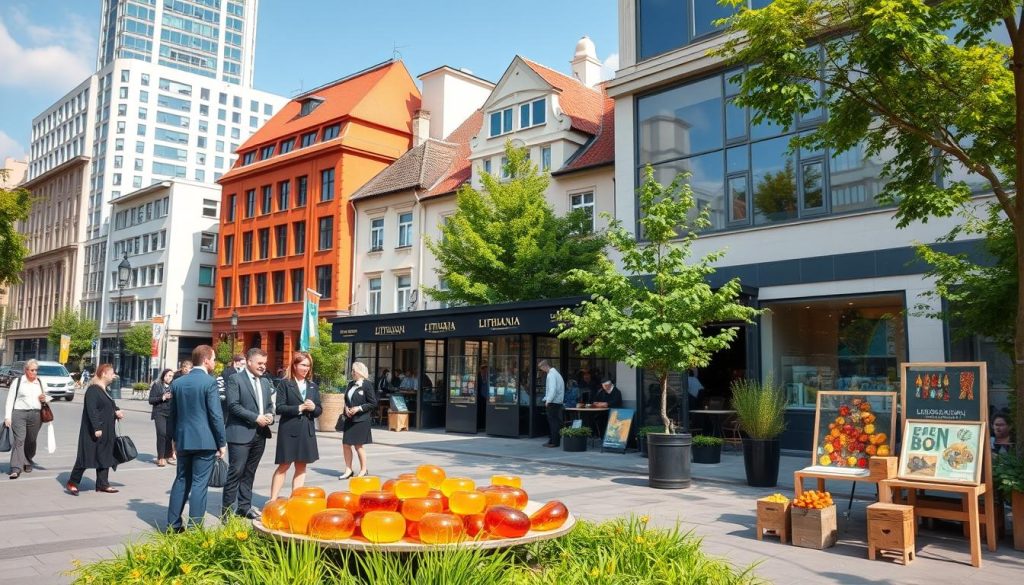The business culture in Lithuania is lively and complex. It shows the country’s rich history and social background. Knowing the Lithuanian business scene is key for success in this European market.
This article offers insights into Lithuania. It highlights the importance of cultural understanding in building strong business ties. It also talks about how to run a business effectively in Lithuania. By grasping the subtleties of Lithuanian business culture, companies can better adapt and compete in this changing environment.
Introduction to Lithuania’s Business Environment

Lithuania is at a key spot in the Baltic region. It offers many market chances for both local and international firms. The country’s economy is growing fast and is becoming more diverse. It has a skilled workforce ready for different sectors.
The business scene here is very good. It has a legal system that supports new businesses. This makes it easy for companies to innovate and work on tech projects. Many foreign investments have come to Lithuania, especially in tech and manufacturing.
These investments show Lithuania’s value as a place for businesses to grow in Europe. With strategic partnerships and a focus on improving the business scene, Lithuania is becoming a major player in Europe.
Understanding the Importance of Business Culture
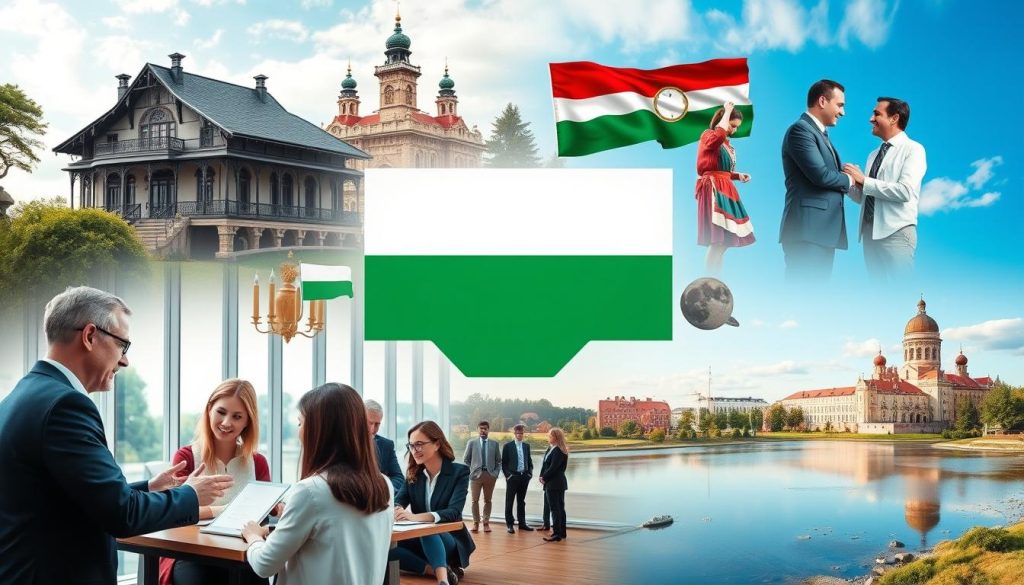
Business culture is all about shared values, norms, and practices in an organisation or region. In Lithuania, it’s crucial for foreign investors and expats to understand this. It affects how they communicate, negotiate, and build relationships.
Being culturally sensitive helps in better collaboration and building trust. This improves personal and business interactions. Knowing the local culture well helps companies meet expectations, leading to success.
Key Aspects of Business Culture in Lithuania

Understanding business culture in Lithuania is key to professional success. The work ethic here is all about quality and responsibility. Lithuanian professionals are dedicated, making a big difference in teamwork.
Work Ethic and Professionalism
Professionals in Lithuania have a strong work ethic. They value quality work and take pride in their achievements. This creates a professional atmosphere where trust and respect are important.
Time Management and Punctuality
Being on time is crucial in Lithuania. It shows respect and dedication to teamwork. Professionals manage their time well, meeting deadlines and keeping projects on track. This shows the value of organisation in work.
Hierarchy and Decision-Making in Lithuanian Companies

Lithuanian companies have a clear organisational hierarchy that values respect for authority. Leadership in Lithuania is key in guiding teams and making important decisions. These decisions greatly affect the company’s success. Yet, there’s a growing trend towards more inclusive decision-making, valuing everyone’s opinions and teamwork.
The Role of Leadership
Leaders in Lithuania are seen as the main decision-makers. They have the knowledge and authority to lead their teams. Their role is not just to direct but also to be responsible for their decisions’ outcomes.
Good leadership in Lithuania builds trust and boosts productivity. It makes employees want to share their ideas and contribute to the team’s success.
Consensus vs. Authority
There’s a move away from just relying on authority in Lithuanian workplaces. Many leaders now see the value in making decisions together. This approach brings in different views, leading to better results.
This mix of authority and team input improves work relationships and performance. It’s a step towards a more collaborative work environment.
Communication Styles in Lithuania
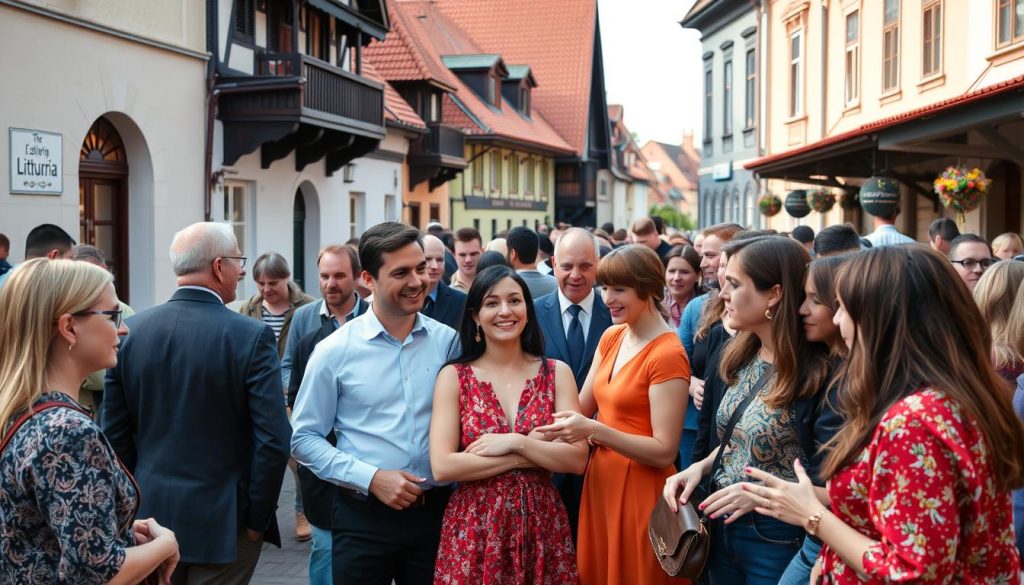
In Lithuania, communication is direct and formal. Business talks value clear and straightforward language. This leads to quick and to-the-point conversations. Complex words are usually avoided, as people prefer simple, direct talks.
Business communication in Lithuania also focuses on non-verbal cues. Things like gestures, facial expressions, and posture are key. Paying attention to these can really help in building good relationships with Lithuanian colleagues.
Being professional is key in business talks. Showing respect and being dedicated makes a good impression. It’s important to be sincere and actively participate in discussions. This builds trust and strengthens business ties.
To sum up, understanding Lithuania’s communication styles is important. Focus on being direct, professional, and aware of non-verbal signals. This will help in making your business interactions in Lithuania more effective and meaningful.
Building Relationships and Networking
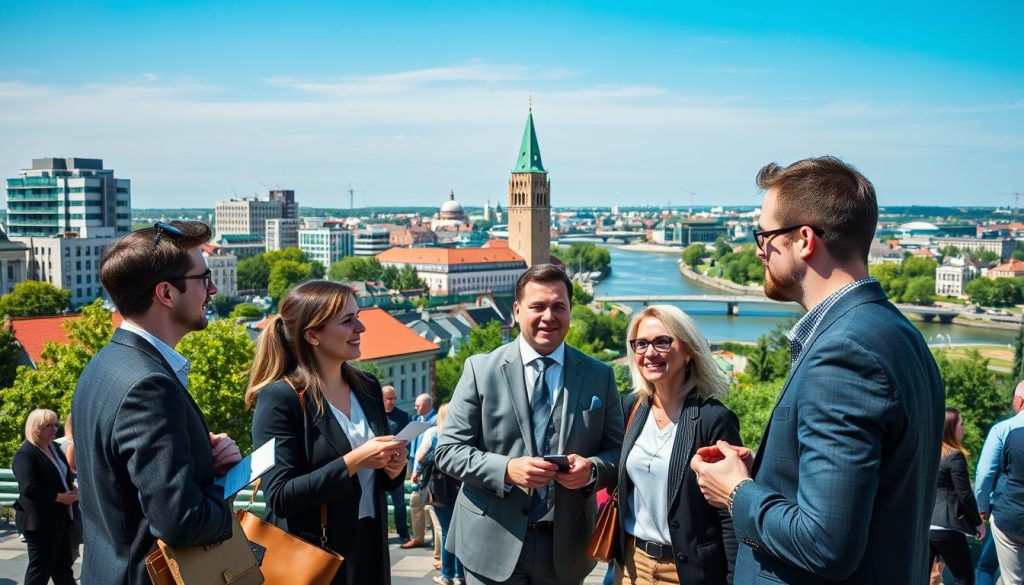
In Lithuania, building trust is key to business relationships. Strong connections are the foundation of success. Getting to know people personally is vital for meaningful partnerships.
Importance of Trust in Business
Trust is very important in Lithuanian business culture. People prefer working with those they know and respect. This leads to lasting partnerships built on trust.
Building a good relationship can improve communication and teamwork. This makes business dealings more successful.
Effective Networking Strategies
Networking in Lithuania needs a smart plan. Here are some tips to help you:
- Go to industry events and trade fairs to meet professionals.
- Use social media to connect with potential partners and clients.
- Join local business groups and chambers of commerce to expand your network.
- Stay in touch with new contacts to keep relationships strong.
Using these strategies can help you build strong business relationships. These relationships are based on trust and can lead to growth.
Business Etiquette and Professional Conduct

In Lithuania, knowing the business etiquette is key to making a good impression. Formal greetings are very important. They show respect and help build relationships. A firm handshake and direct eye contact are the usual way to greet someone.
It’s also important to use titles and last names until you’re told otherwise. This shows respect in work settings.
Formalities and Greetings
In work, there are certain formalities to follow:
- Always greet people when you arrive.
- Use formal titles like Mr, Mrs, or Ms, followed by their last name.
- Keep eye contact to show confidence and honesty.
Dress Code in the Workplace
In Lithuania, work clothes are usually formal. This shows respect for the job and the company. Here’s what’s expected:
- Men should wear business suits, and women should wear professional dresses or suits.
- Stick to conservative colours and styles.
- Avoid casual clothes like jeans or sneakers in work.
Understanding Lithuanian Negotiation Techniques
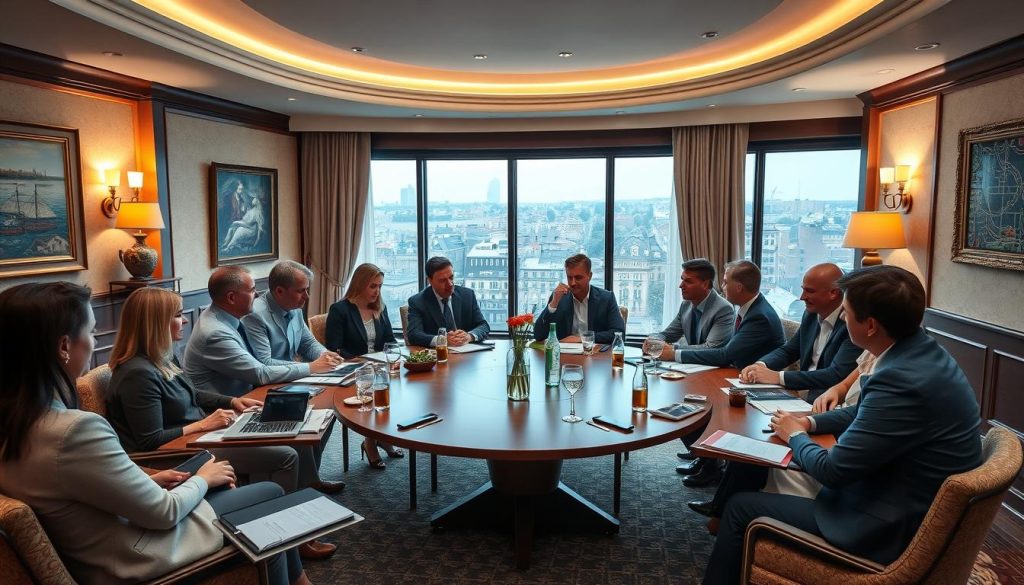
Negotiation in Lithuania is a detailed process that needs careful planning and a smart strategy. Good negotiation skills are key to getting good results and building strong relationships. Lithuanians value being direct, preferring clear and open talks.
Preparation and Research
It’s vital to do thorough research before starting negotiations. Knowing the cultural background and the industry’s specifics helps shape your negotiation plan. Important steps in preparation are:
- Identifying the interests and goals of all parties involved.
- Researching market trends and economic conditions.
- Gathering information on the counterpart’s negotiation style and history.
This preparation not only gives you an edge but also increases the chance of finding agreements that meet both sides’ needs.
Facilitating Win-Win Outcomes
Winning negotiations mean focusing on solutions that benefit everyone. Lithuanian negotiators look for ways to help all parties, encouraging teamwork. Strategies for achieving these outcomes include:
- Encouraging open communication to explore needs and preferences.
- Utilising creative problem-solving techniques to generate options.
- Remaining flexible and adaptable during discussions.
By aiming for mutual benefits, negotiators build trust and a good relationship. This can lead to successful partnerships in the future.
Cultural Sensitivities to Consider
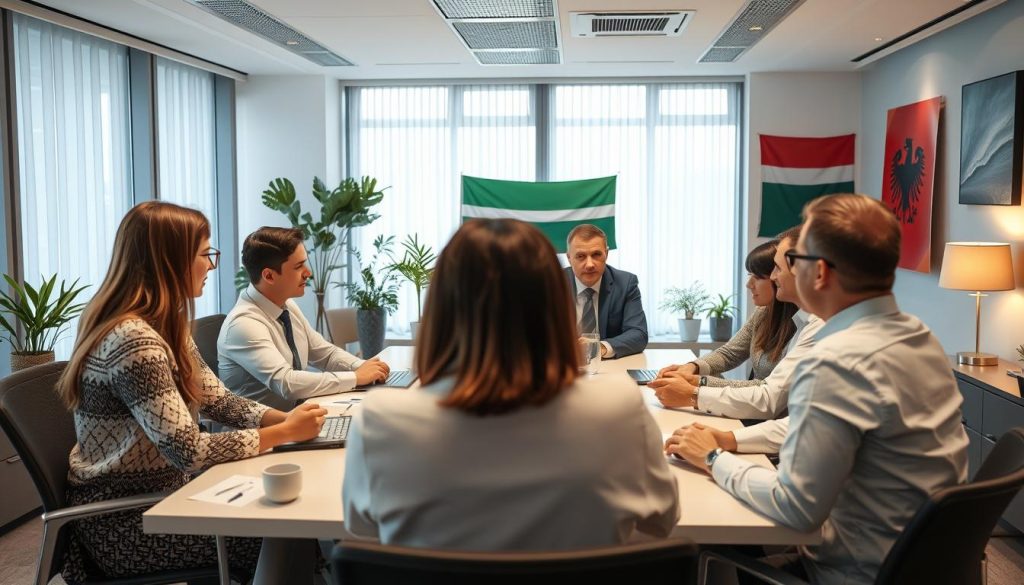
When doing business in Lithuania, knowing about cultural sensitivity is key. The country’s history, with big events, affects how people interact and make decisions. This is important to understand.
Respecting Historical Contexts
Lithuania’s past is a big part of its identity today. Knowing about its history, like the Soviet rule and fight for freedom, helps build connections. Showing you understand these events shows respect and makes business easier.
It’s smart to learn about Lithuania’s history before you start talking or negotiating.
Understanding the Role of Language
Even though many Lithuanians speak English, language can still be a barrier. Learning some basic Lithuanian phrases shows you care and respect. This helps build trust and is a good start for working together.
Adapting to Change: Evolving Business Practices

The Lithuanian business scene is changing fast. Companies are learning to adapt to a world that’s always shifting. This is key to staying ahead and growing in a tough global market.
Innovation is at the heart of this change. Businesses are using new digital tools to work better, serve customers better, and stay ahead. Cloud computing and data analytics help them make quick, smart choices.
For companies looking to enter Lithuania, knowing how to adapt is crucial. The local culture values being flexible and quick to change. Those who focus on innovation will find success in this fast-paced market.
Technology’s Impact on Business Culture
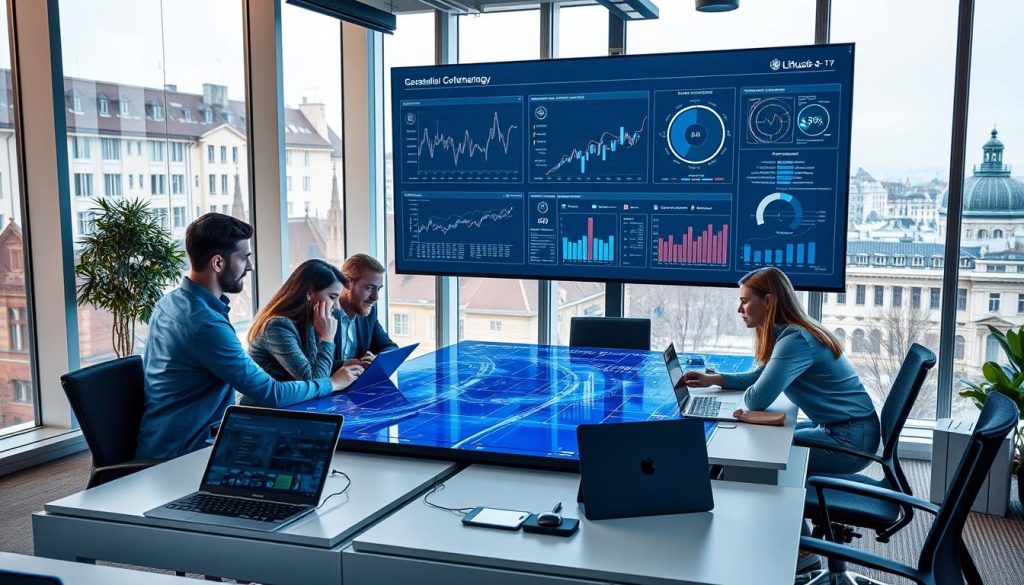
In recent years, technology has changed business culture in Lithuania a lot. The rise of remote working has led to more flexible work setups. Now, where you work is not as important as it used to be.
This change has made digital tools key for keeping work flowing smoothly. They help teams work together, even when they’re not in the same place.
Rise of Remote Work
The COVID-19 pandemic made remote work more common in Lithuania. Companies found they could keep working even when people weren’t in the office. This change made them rethink their office spaces.
It led to happier employees with better work-life balance. It also saved money on travel. And it opened up the job market, letting companies find the best talent anywhere.
Digital Communication Tools
Now, digital tools are vital for teamwork and staying in touch. They’re especially important when you can’t meet face-to-face. Some of the most used tools are:
- Video conferencing for meetings.
- Project management software to keep work on track.
- Instant messaging for quick chats.
Using these tools well is crucial. Companies need to train their staff to use them effectively. This ensures everyone can do well in a digital world.
Differences in Regional Business Practices
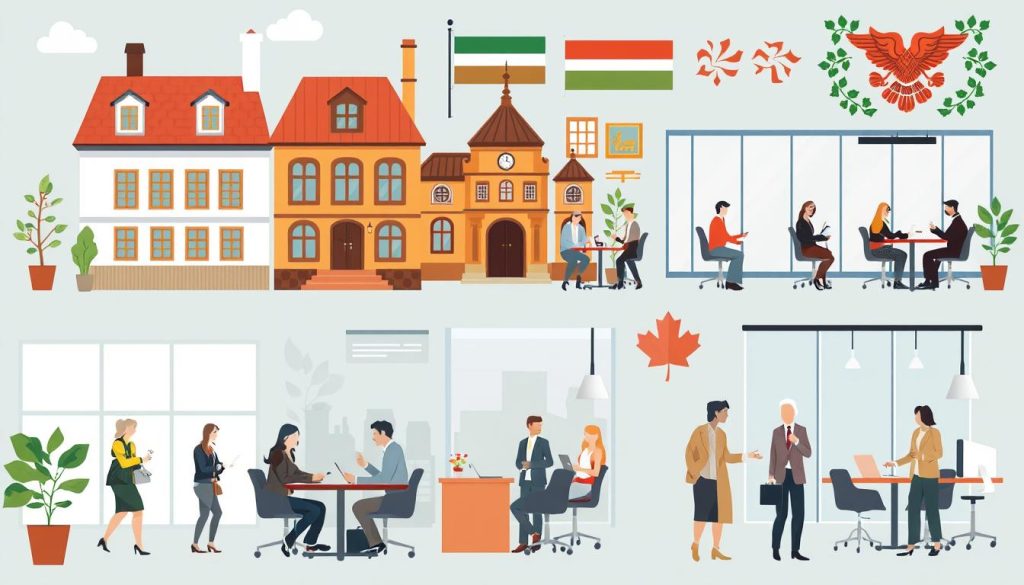
Lithuania’s varied geography shapes its business practices. Different areas have their own cultural traits that affect local business culture. Knowing these differences helps in creating better business strategies.
In cities like Vilnius and Kaunas, businesses are fast-paced and modern. They focus on being efficient and innovative. People here value direct communication and getting results.
In contrast, rural areas put more emphasis on building relationships and following traditional practices. Here, personal connections are key in business.
- Urban environments often embrace:
- Technological advancements
- Networking events and professional meetups
- Dynamic marketing strategies
- Community-oriented practices
- Long-term partnerships
- Local customs and traditions
By understanding these regional practices, companies can adapt their strategies. This makes their connections and success better across Lithuania.
Future Trends in Lithuanian Business Culture

Lithuania’s business scene is about to change a lot. These changes will be influenced by globalisation and a focus on sustainability. These trends will shape the future of business in Lithuania.
Increased Global Integration
Lithuania’s economy is growing, and it’s becoming more global. The tech sector is leading the way with more international partnerships. Companies are using digital tools to reach out to the world.
This global approach brings new ideas and makes businesses more competitive.
Focus on Sustainability
Sustainability is becoming key for businesses in Lithuania. With more people caring about the environment and laws getting stricter, companies are going green. They’re making products that are better for the planet and using eco-friendly technologies.
This move towards sustainability is not just a trend. It’s becoming a part of what makes a brand stand out and keeps customers loyal.
Case Studies of Successful Businesses in Lithuania
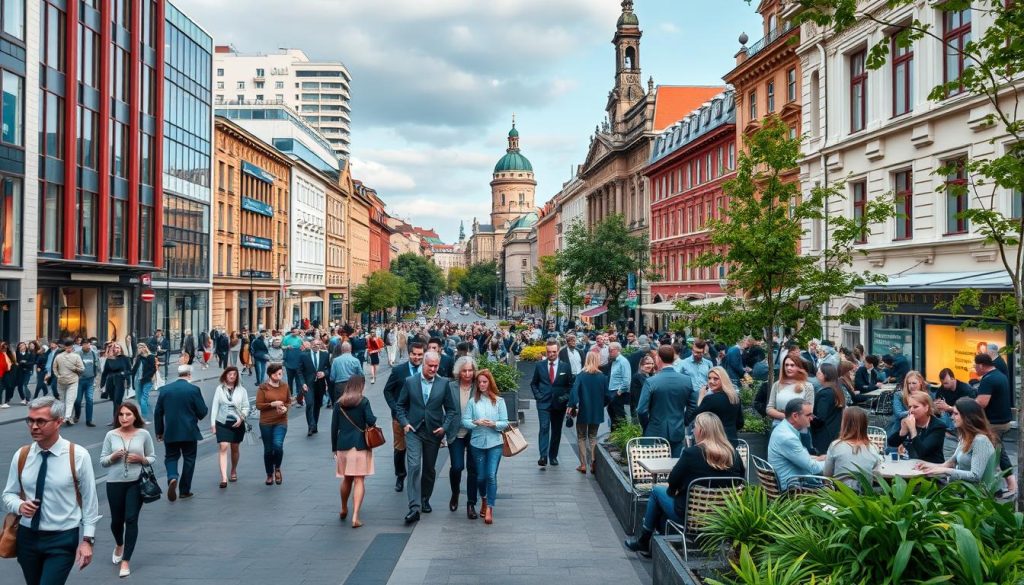
Looking at successful businesses in Lithuania gives us insights into how they work. We see how they fit into the local culture and grow. This shows us the key to their success.
Local Startups Making Waves
Startups like Vinted show the creativity and hard work in Lithuania. Started in 2008, Vinted changed the second-hand clothing market. It lets people buy, sell, and swap clothes online.
This startup uses Lithuania’s love for sustainability. It also attracts people who want eco-friendly choices. Their story shows how knowing the local culture can lead to big success.
International Companies Thriving in the Market
Companies like Western Union see the potential in Lithuania. They work well here by understanding local values. They adjust their services to meet Lithuanian needs.
This shows how knowing the culture can help businesses succeed. These examples show the value of mixing global practices with local knowledge. This helps them stay relevant and successful.
The Role of Education in Shaping Business Culture

Education is key in building Lithuania’s business culture. It affects many parts of the workplace. The Lithuanian education system focuses on higher education and vocational training.
This approach helps people get the skills needed to succeed in a competitive market. It prepares employees for different industries. The education system also encourages adaptability and entrepreneurship.
- Higher education institutions work with businesses to make sure the curriculum is relevant.
- Vocational training programmes give hands-on experience that meets industry needs.
- Programmes promote ongoing professional development throughout one’s career.
These strategies improve workforce skills and create a culture of innovation and efficiency. As Lithuania grows globally, education and business culture are crucial. They help create a workforce ready for future challenges.
Conclusion Remarks on Navigating Business Culture in Lithuania
Reflecting on business culture in Lithuania shows how crucial it is to understand this market well. Trust is key in professional relationships here. It helps build strong partnerships and a collaborative environment for success.
Effective communication, respecting cultural differences, is also vital. It ensures clear understanding and avoids misunderstandings. Following local business etiquette and valuing formalities can create lasting connections and open up many opportunities.
In conclusion, being adaptable and open to change is essential in Lithuania’s business world. These values improve professional interactions and pave the way for successful collaborations. They create a solid base for thriving in this dynamic environment.

